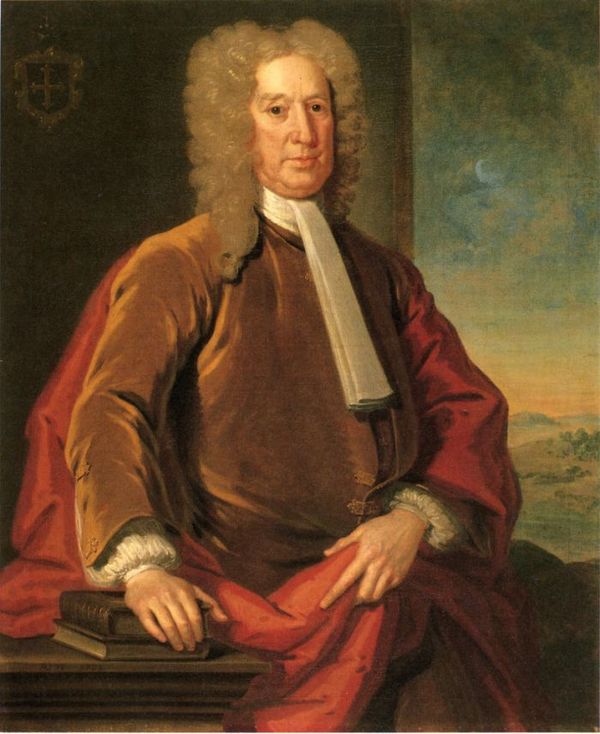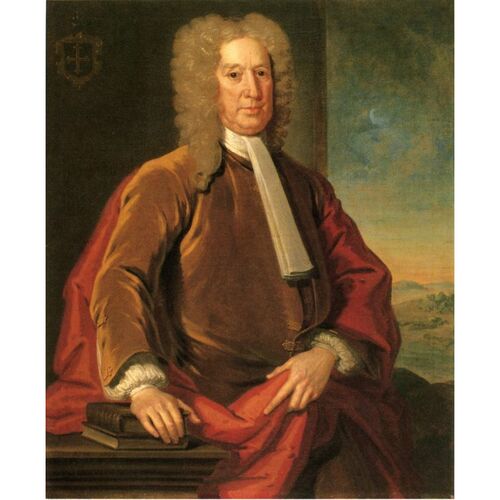
Source: Courtesy of Wikimedia Commons
NELSON, JOHN, Boston merchant and statesman; b. 1654 in or near London, England, son of Robert Nelson, and of Mary Temple, sister of Sir Thomas Temple*; married Elizabeth Tailer, niece of William Stoughton, governor of Massachusetts; d. 15 Nov. 1734, in Boston.
Nelson came to Boston from England about 1670, and by his own admission became involved that same year in the trade his uncle, Sir Thomas Temple, was conducting with the French in Acadia and New France. He became Temple’s principal heir after the latter died in 1674. Nelson was so familiar with the French colonies that he was sent to Quebec in 1682 to negotiate a settlement of grievances between New England and New France. Nelson resolved the dispute temporarily and emerged with permission, effective to 1684, to sell fishing and trading permits for the Acadian coast.
Nelson’s name next crops up in 1689, when he played a major role in the overthrow of Sir Edmund Andros and the Dominion of New England. A year later he proposed an expedition against Port-Royal (Annapolis Royal, N.S.). When William Phips* was chosen leader instead of himself, Nelson refused to have anything more to do with the venture. Nevertheless, in 1691, after Port-Royal’s capture, he and six other merchants concluded an agreement with the Massachusetts government to provide a garrison there in exchange for a monopoly of the area’s trade for the next five years. Nelson had been on such good terms with the French authorities that he had been able thus far to maintain a warehouse in Port-Royal. While trading in Acadia in 1691, however, Nelson and a number of other New Englanders were captured by a French cruiser, and Nelson was sent to Quebec. Among the others taken were Colonel Edward Tyng*, newly appointed governor of Acadia, and John Alden, the latter apparently a colleague of Nelson, as he was one of the backers of Nelson’s original proposal to seize Port-Royal.
While at Quebec Nelson was treated with the utmost courtesy, but his vast knowledge of New France apparently precluded his release during King William’s War (War of the League of Augsburg). His privileged position came to an end after he bribed two French soldiers to smuggle word to Boston of an impending border raid. Nelson’s actions became known to the French when the soldiers were later captured after an abortive attempt on the life of Jean-Vincent d’Abbadie de Saint-Castin in 1692. Shortly thereafter he was sent to France, where he languished for several years in prison, first in a dungeon of the castle of Angoulême and then in the Bastille.
In 1694 he was released on parole and sent to London to transmit a French proposal for the neutrality of America. When the French plan was peremptorily rejected, Nelson turned propagandist, and advanced several proposals of his own for the union of New York and New England, and for the capture of Canada. He also proposed that the St George River, and not the Kennebec, be recognized as the boundary between Acadia and New England. The Board of Trade showed some interest in the schemes, but no serious steps were taken to implement them. At the end of the war in 1697 Nelson returned to Boston, resuming his trade with Acadia, which he pursued until at least 1706. He continued to be active in New England and continental affairs for some time, and in 1730 finally sold the claims to Nova Scotia which he had inherited from Temple to Samuel Waldo*.
AN, Col., F3, 2. BM, Lansdowne MS 849. “Mass. Archives,” XXVI, 108. PANS, MS docs. II, 30. Coll. de manuscrits relatifs à la N.-F. “Journal of expedition against Port Royal, 1690.” Mémoires des commissaires, I, 56, 61; II, 286, 328–29, 330–33; and Memorials of the English and French commissaries, I, 127, 138–39, 571, 615, 617–19. NYCD (O’Callaghan and Fernow), IV, IX. PRO, CSP, Col., 1689–92, 1696–97. Webster, Acadia. DAB. Brebner, New England’s outpost. A. H. Buffington, “John Nelson’s voyage to Quebec in 1682: a chapter in the fisheries controversy,” in Col. Soc. Mass., Trans., 1924–26 (Pub., XXVI, Boston, 1927), 431. B. T. McCully, “The New England-Acadia fishery dispute and the Nicholson mission of August, 1687,” Essex Institute, Salem, Mass., Hist. Coll., XCVI (1960), 280.
Cite This Article
Donald F. Chard, “NELSON, JOHN,” in Dictionary of Canadian Biography, vol. 2, University of Toronto/Université Laval, 2003–, accessed December 30, 2025, https://www.biographi.ca/en/bio/nelson_john_2E.html.
The citation above shows the format for footnotes and endnotes according to the Chicago manual of style (16th edition). Information to be used in other citation formats:
| Permalink: | https://www.biographi.ca/en/bio/nelson_john_2E.html |
| Author of Article: | Donald F. Chard |
| Title of Article: | NELSON, JOHN |
| Publication Name: | Dictionary of Canadian Biography, vol. 2 |
| Publisher: | University of Toronto/Université Laval |
| Year of publication: | 1969 |
| Year of revision: | 1982 |
| Access Date: | December 30, 2025 |



